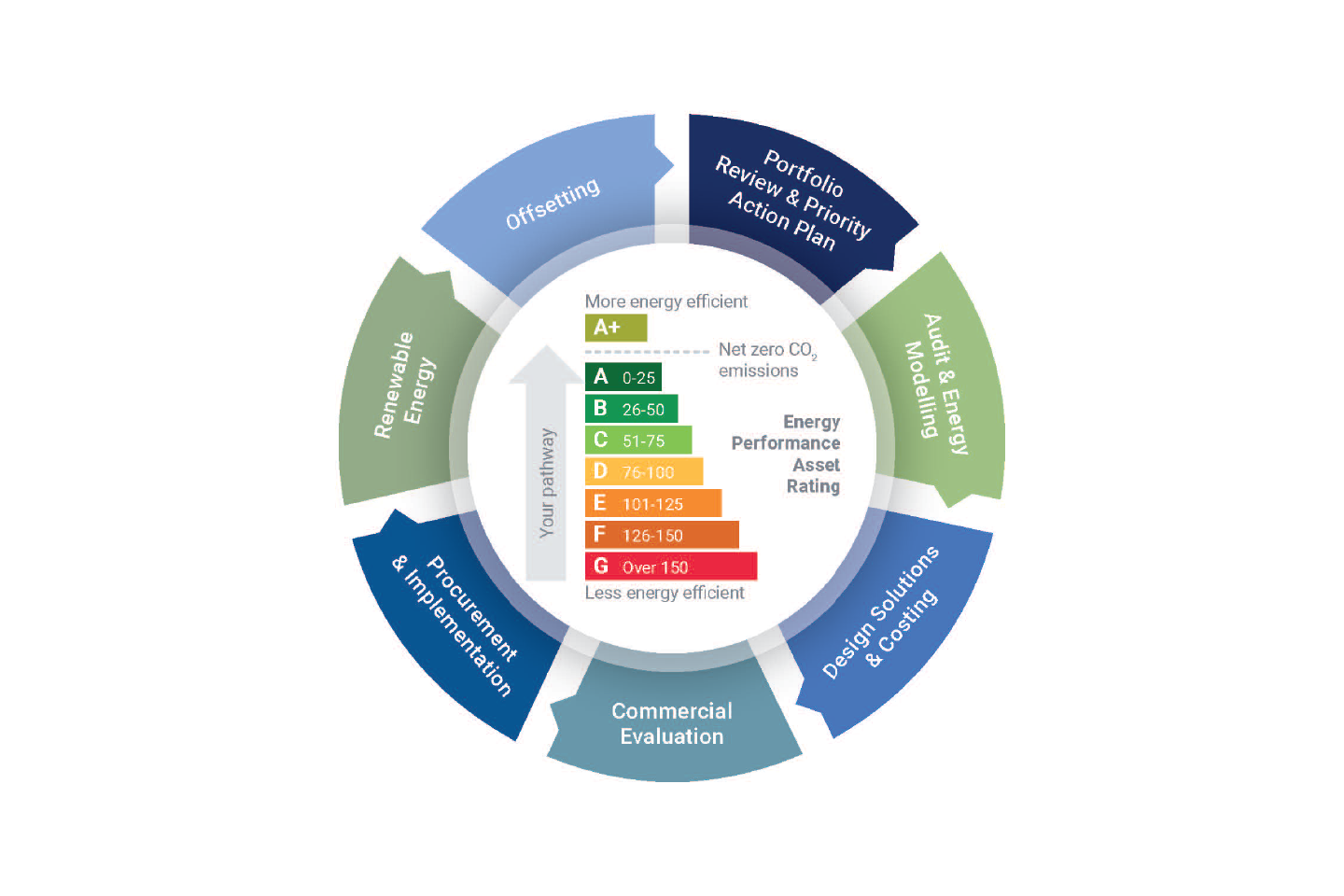
After announcing plans to reform Energy Performance Certificates (EPCs) earlier this year, the new Government has launched a consultation on changes to the Energy Performance of Buildings (EPB) regulations. EPCs have been a mandatory requirement for buildings built, sold, or let since 2008. This consultation marks the first major review since 2012, following an unimplemented consultation in 2021. We spoke to Philip Chapman, our Sustainability Adviser, and ESG Partner Rachel Bridge, who provided an overview of the proposed changes and their implications for landlords.
EPCs were introduced as a tool to help occupiers understand and compare the energy performance of buildings, aiming to support reductions in reduce energy use and carbon emissions. Despite debate about their effectiveness, EPCs remain a key metric in the property sector, required for both domestic and non-domestic buildings with limited exceptions. They currently provide a rating from A+ to G and are valid for 10 years.
The consultation covers several elements including:
- Clarifying and consolidating regulations updating EPC metrics
- Enhancing requirements for EPCs and Display Energy Certificates (DECs)
- Improving data management and quality control
- Revising Air Conditioning Inspection Reports (ACIRs)
For landlords, significant proposals include
- Reducing EPC validity period from 10 years to ensure more regular assessments to reflect changes in the building
- Requiring EPCs for Listed Buildings: Clarifying the applicability of EPCs and MEES regulations to listed buildings
- Mandating valid EPCs throughout tenancies so that a valid EPC is always required for existing lettings closing an existing ‘loophole’ which allows the continued letting of property with an expired EPC
- Requiring a valid EPCs before a property can be marketed for sale or letting
- Enhancing enforcement and penalties for non-compliance
For domestic properties specifically, the proposed changes include updates to the headline metrics in EPCs, the inclusion of Houses in Multiple Occupation (HMOs), and bringing short-term holiday lets into the scope of the regulations.
For non-domestic properties, there are amendments to the need for DECs in publicly accessible buildings and changes to the requirements for air conditioning inspection reports.
Implications for Property Owners
Despite being around for over 15 years, the relevance of EPCs increased from 2018 with the introduction of the Minimum Energy Efficiency Standards (MEES) regulations, which currently require landlords to achieve a minimum EPC rating of E before a building can be legally let. This requirement has increased the significance of EPCs to property owners as they can impact the rental potential and value of a property.
The Government’s aim is to make EPCs a more useful tool in promoting energy efficiency and carbon reduction in both domestic and non-domestic buildings, which is crucial for the UK’s decarbonisation goals.
This consultation provides an opportunity to seek changes to EPCs for the first time in a decade. While the proposed reforms aim to simplify and clarify the application of EPCs, property owners and landlords may be concerned about the practical implications, especially in the wider context of MEES regulations. . It is important for stakeholders to engage with the process to highlight where policy could be improved to aid practical implementation.
Property owners recognise the importance of improving energy and carbon efficiency considering both the drive for net zero and rising costs faced by occupiers. However, the challenges of implementing improvements to EPC ratings, particularly in occupied buildings and heritage assets, should not be overlooked. There is often limited scope for landlords to implement changes to their buildings once a tenant is in occupation, which could make MEES compliance impractical during a lease.
The application of EPCs to heritage properties simplifies a grey area, but owners of these assets will be concerned by the implications for MEES compliance on these often hard-to-treat buildings, with potential for poorly implemented improvements to cause damage. While a series of exemptions exist, evidencing that a building qualifies is often, costly and impractical for property owners.
Rachel said: "The challenge of achieving net zero requires property owners to develop strategies that ensure their portfolios meet minimum standards, maintain asset value, and avoid stranded assets. Recognising the need to make EPCs more effective in addressing building emissions is welcome, however the application of EPCs and MEES must be practical and consider the practicalities for both landlords and tenants to achieve the best outcomes.
"Fisher German can assist landlords in understanding the impact of their investments and in protecting value through practical measures that deliver real benefits."
Philip added: "Our Delivering Net Zero service is perfectly positioned to help clients create tailored pathways to achieve MEES compliance and net zero for their property portfolios. We offer strategic consultancy, audits, energy modelling, design and cost solutions, commercial evaluation, procurement and implementation, renewable energy solutions, and offsetting if necessary.
"This service has been developed in collaboration with our building consultancy team and experts in green energy, valuation, and lease advisory. We provide a comprehensive service that offers clients a turnkey solution, rather than evaluating assets in isolation. It goes beyond the basic provision of an EPC, offering detailed insights on optimising EPC ratings through the assessment process and identifying cost-effective improvements."






